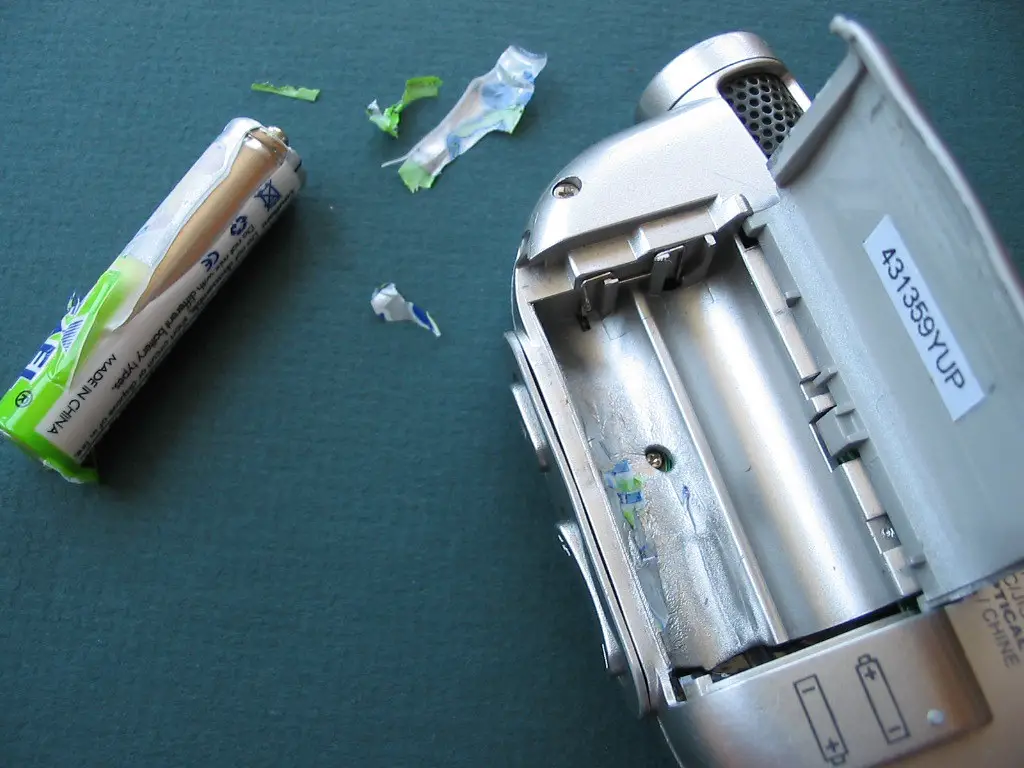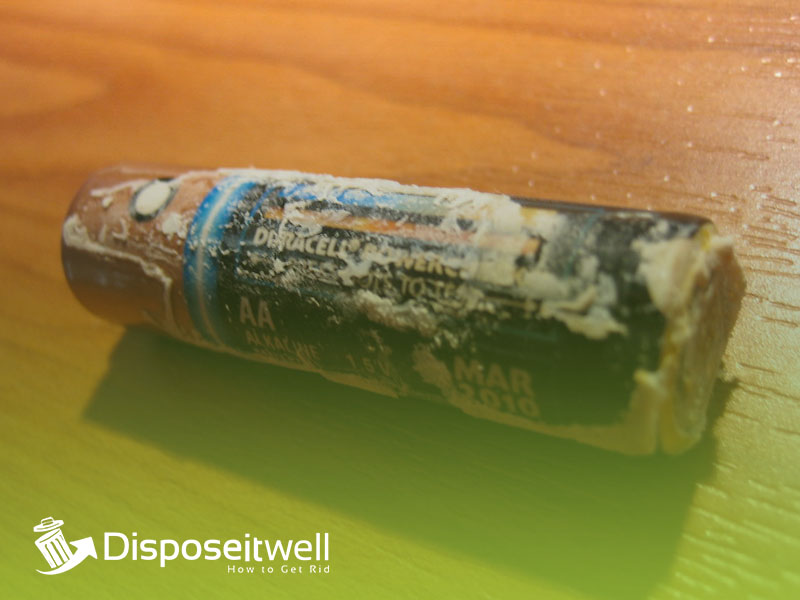Disposing of leaking batteries can be challenging, especially if you don’t know the right way to do it. The Environmental Protection Agency (EPA) warns that when not properly handled, batteries may pose a hazard to human health or the environment due to their metal content, including mercury, lead, cadmium, nickel, and silver.
To properly get rid of leaking batteries start by wrapping the battery in a paper towel to avoid contact with the skin. Place the battery in a plastic bag and tape it shut, then drop it off at a designated local recycling center.
If a recycling center is not available, contact your local waste management authority for advice on proper battery disposal. Also, don’t forget to clean up the cleaning acid but wear protective gear while doing so.
What Is Battery Acid?
Battery acid is the common name for the electrolyte solution used in lead-acid batteries, such as those found in automobiles. The electrolyte solution is made up of sulfuric acid and water and is typically around 35% sulfuric acid and 65% water (by weight). It is highly corrosive and has a pH of less than 1.
Battery acid is highly eroding and can cause serious injury or death if it comes in contact with skin, eyes, or any part of the body. It is important to wear safety glasses and protective clothing when handling battery acid and to avoid contact with skin and eyes. Additionally, it should always be stored in an approved, sealed acid container.
Why Do Battery Leak?
Battery leaks occur when the active material inside the battery reacts with the electrolyte, producing gas bubbles that increase the pressure inside the battery. This pressure can cause the battery to rupture and leak its contents, which can be corrosive. However other common causes of battery leaks are explained below:
- Overcharging: If a battery is overcharged, it can cause electrolytes to escape through the seals and vents, resulting in a leak. This typically occurs when batteries are left on a charger for too long, or when the charger is faulty.
- Old Age: Batteries naturally suffer from “self-discharge” over time and can eventually become unable to hold a charge. As the battery gets older, the internal components can become weaker and start to deteriorate, leading to electrolyte leaking from the cell.
- Temperature: Temperature fluctuations can also cause battery leakage. High temperatures can cause the electrolyte inside the battery to evaporate, while low temperatures can cause the electrolyte to freeze and expand, resulting in the seals being forced open.
- Damaged Seals: Cracked or damaged seals on battery cells can lead to a hazardous battery leak. This can occur due to accidental physical damage like dropping the battery, or even due to flaws in the manufacturing process.
- Overuse: When a battery is overused, it can become exhausted and start to seep. This is especially the case with rechargeable batteries, for the more they are used, the quicker their expiration.
How to Avoid Batteries Leaking?
Electronic devices are often powered by batteries, but when these batteries start to leak, it can lead to a world of trouble. To help prevent this, it’s wise to take certain precautions as discussed below:
- Choose the Right Battery: Look for batteries that are designed for the specific device you are using.
- Store Batteries Properly: Store batteries in a cool, dry place. Excessive heat can cause batteries to degrade more quickly and can lead to leakage.
- Don’t Mix Battery Types: Don’t mix battery types, such as alkaline and rechargeable, in the same device.
- Remove Batteries When Not in Use: Remove batteries from devices that are not in use for extended periods of time.
- Don’t Overcharge: Don’t leave rechargeable batteries in a charger for too long, as this can cause them to overheat and leak.
- Inspect Batteries Regularly: Check your batteries regularly to make sure they are not leaking or bulging.
- Check Expiry Date: Check the expiration date of the batteries before use. Batteries can go bad over time, and using expired batteries can lead to leakage.
How to Store Leaked Batteries?
It’s essential to safeguard against potential fire or health issues by properly storing any leaked batteries. Here are some ways to do so:
- Isolation: Isolation is a good way to store leaking batteries as it prevents contact between the hazardous material and the surrounding environment. This can be done by placing the batteries in containers that are sealed and equipped with proper ventilation.
- Neutralization: The process of Neutralization is invaluable in combating the effects of overly acidic liquids. By adding a neutralizing agent to a leaking battery, the acidity can be brought down to a safe level, safeguarding the environment from any potential contamination.
- Encapsulation: Encapsulation is the process of covering the leaking battery with a protective coating, such as a plastic or rubber material, to prevent contact between the hazardous material and the environment.
- Cooling: Leaked batteries should be kept in a cool place. If the temperature is too hot, then the battery can overheat and potentially cause a fire.
How to Dispose of Leaking Batteries

It’s essential to properly dispose of leaking batteries, both for the sake of preserving the environment and for the safety of handling any hazardous materials. Follow these useful tips for getting rid of them:
- Wear rubber gloves and safety glasses: Before handling any leaking batteries, it is important to wear protective gloves and safety glasses to protect your hands and eyes from any hazardous materials or fumes.
- Place leaking batteries in an airtight container: Once the leaking batteries have been identified, place them in a sealed container, such as a plastic bag or a leak-proof container.
- Clean Battery Acid: Clean up any battery acid that may have leaked onto surfaces. Use a mixture of baking soda and water to neutralize the acid and then use a damp cloth to wipe it away.
- Contact Local Recycling Center: After the corrosive battery acid has been taken care of, it’s important to find out the right way to get rid of any batteries that have been leaking. Reach out to your local recycling center to learn the correct protocol.
- Return the Battery To The Retailer: If you have a special battery like a lithium-ion or lead acid battery or others, you can also take it back to the retailer. They have the know-how and the resources to aid in properly getting rid of these kinds of batteries.
Safety Precautions
The safe disposal of leaking batteries is an absolute must, for it involves the handling of toxic materials that could be detrimental to the environment, as well as our health.
To ensure that these hazardous materials are disposed of correctly, certain safety precautions must be taken as mentioned below:
- Wear protective gloves and eye protection to protect from acid and any other hazardous material.
- When pulling out the battery ensures the battery is completely disconnected from power sources and any other devices.
- Place the leaking battery in a sealed plastic bag or container.
- Place the sealed container in a larger container filled with an absorbent material, such as vermiculite or kitty litter.
- Make sure the containers are labeled with a warning label.
- Dispose of the vessel in accordance with local, state, and federal regulations.
- If in doubt, contact your local hazardous waste disposal service.
- Wash hands and face thoroughly after handling the battery.
FAQs
Are leaking batteries hazardous waste?
Yes, leaking batteries are considered hazardous waste. Toxic substances such as lead and mercury lurk inside batteries and when not properly discarded, these elements can seep into the environment and cause irreparable harm. The acids held inside batteries can also do irreparable damage if not disposed of correctly. To protect our planet from the dangers of batteries, we must ensure to responsibly discard all leaking batteries.
Can leaking batteries start a fire?
Yes, leaking batteries can start a fire. This is because the lithium inside them is highly reactive and can cause a chemical reaction when it comes into contact with other substances. This reaction can create heat, which can quickly ignite and cause a fire.
What happens if you touch a leaking battery?
Touching a leaking battery can be dangerous and can cause harm to your skin. Leaking batteries contain corrosive chemicals such as sulfuric acid, which can cause serious burns, skin irritation, and even blindness if it comes into contact with the eyes. It is important to avoid contact with a leaking battery and to dispose of it properly.
Final Verdict
It’s never been more important to play your part in keeping our planet clean and safe. Leaking batteries can be dangerous, not just to our surroundings but also to ourselves and our families. By implementing a few simple steps and staying informed, we can all help to protect the environment.
Remember: safety is key when getting rid of leaking batteries, so always handle them with care, be sure to follow local regulations, and never take the risk of poor disposal. Properly disposing of leaking batteries is an essential contribution to the health of our planet!
Thank you for reading!
My name is Ella Vicedomine and I’m the founder of this blog. The aim is to start this informational blog to guide people on how to dispose of waste things around in the house but in the right way.

